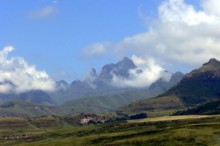Profile
Blog
Photos
Videos
2nd Half
HOLIDAYS:
1.Term/ fixed holiday dates for the following year;
1 week at the end of September
6 weeks in December / January
2 ½ weeks in March/ April
2 weeks in June / July
2.Amount of time off a volunteer can expect on a weekly basis:
It is flexible, but will ensure suitable free-time
3.Length of longer holidays:
6 weeks
4.Where to go for weekends and longer breaks:
School will assist in arranging tours and excursions
ACCOMMODATION:
1.Type of accommodation: (a brief description - size, number of rooms, furniture.)
School hostel: Private flat with 2 rooms (2 single beds each and build-in cupboards, table, chairs) sharing 1 bathroom with toilet and shared outside balcony.
2.Whether shared and if so, with whom:
Your PT partner
3.Distance from your work place:
40 m.
4.Most likely means of travel to your work place:
walk
5.Electricity supply:
Normal different plugs easily available but it's best to take an adaptor for three pin plugs. You can buy these at the airport!
6.Water supply:
Normal. Suitable for drinking.
7.Eating arrangements:
Breakfast, Dinner and Light Evening Meal are served on a daily basis in the dining room according to the Hostel schedule.
8.If self catering, what will you cook on and what cooking equipment is there:
9.
When necessary, permission from the Hostel Superintendent must be obtained before Hostel kitchen facility can be used privately.
10.Whether you will do your own shopping for food:
11.
Not necessary. Meals will be provided at no cost. Snacks can be bought in town at own cost.
12.Amount you are likely to spend on food each week:
Not necessary
13.Places to shop for food, and staples to buy:
In town
14.Typical return fare to shops:
No costs involved
15.Other comments about accommodation.In particular, whether a mosquito net is required and if so whether one is available or should be obtained before leaving the UK.
Everything required available on site.
CLOTHING AND EQUIPMENT:
1.Suitable working clothes (include skirt length if appropriate):
Smart casual.
2.Suitable off duty clothes:
Jeans etc. something to go out in for special occasions.
3.Clothes best obtained overseas:
Everything is easily available. Flip flops etc can be bought in SA, but substantial shoes are best to bring from home.
4.Clothes which must be brought from the UK:
General everyday wear. You do not want to spend your precious money on boring clothing. Trainers are cheaper in the UK.
5.Advice on footwear:
Trainers and smart comfortable shoes for school. Something cooler like flip-flops also come in handy.
6.A suggested clothes list:
As per PT list
7.Equipment which should be brought from the UK for work:
Maybe some stationery and pencil case, some craft idea books.
8.Equipment which should be brought from the UK for personal use:
CD player, Playing Cards and books
9.Other comments on clothes:
In the winter (May June July August) it does get very cold at night bring Jumpers and warm socks
White clothes turn grey quickly.
HEALTH:
1.Nearest medical services for minor ailments:
hospital and qualified doctor just down the road,
2.Nearest medical services for major problems (distance and time):
Government hospital in Lady Grey. Private hospital Bleomfontein.
3.Whether any medical supplies are necessary in addition to those recommended:
A box of protective gloves
4.Medical supplies obtainable locally:
Everything
5.Any other comments:
Because of the high % of HIV/AIDS always use protective gloves when dealing with any blood related matter
MISCELLANEOUS:
1.Name and address and distance of nearest bank:
All banks are easily accessible: Standard Bank / First National Bank
2.Useful contacts made by last years volunteers/ representative:
You will meet people as you settle in and if you give a good impression- mature and sensible- people will want to get to know you.
3.Local Language:
English, Afrikaans, Xhosa, Sotho
4.Things exceptionally expensive locally:
Photo developing, imported clothing
5.Things exceptionally cheap locally:
Alcohol, stamps, fruit and veg groceries
6.Items of clothing/equipment that deteriorate quickly because of the climate/local conditions:
Need to wash clothes after one wear due to heat and dust. Laundry service available at no cost in Hostel.
7.Additional things your predecessors would have taken in the light of experience, and things they found particularly useful:
More than one pair of jeans, hoodies & waterproof jacket
8.Special points not covered elsewhere:
Sunscreen. The African sun is vicious. A money bag is useful but can draw attention in some cases. Don't wear lots of jewellery or an expensive watch. Take advice from the locals about safe areas
A mobile phone is invaluable when it comes to keeping in touch with friends in South Africa, and is also extremely useful for your desk officer. You can buy a sim card cheap out there.
You will get access to the internet from time- to- time.
- comments




